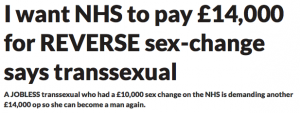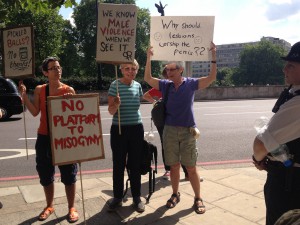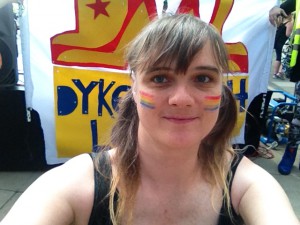I have been given to understand that the issue of the spousal veto in the Same Sex Marriage Bill is confusing to those not immersed in trans issues. I appreciate that, because if you don’t understand the processes we have to go through, then it’s not clear what is being vetoed and under what circumstances. I’ll attempt to explain. It’s long, but if you scroll to the bottom there is an executive summary.
Part 1: Corbett v Corbett
In 1970, the divorce of trans woman model, April Ashley and Arthur Corbett, later the 3rd Baron Rowallan, came before the court. In order to avoid giving up part of his substantial estate, Corbett’s team advanced the argument that the marriage was never valid in the first place, because April Ashley was really a man.
The judge agreed and thus set a precedent that meant that trans people were, from that point on, treated by the government as their birth sex forever for all sorts of legal reasons. This didn’t just affect marriage: it also affected stuff like employment protections, what prison you would be sent to if you were found guilty of an offence, and so on.
Prior to this, trans people had been applying for corrected birth certificates and getting them, effectively being recognised in their new gender. This practice ceased completely, and trans rights in the UK entered a dark age.
Part 2: The Gender Recognition Act
Fast forward 3 decades. The European Court of Human Rights had ruled that the government had to legislate to fix the unfairness inflicted upon trans people by the Corbett v Corbett ruling. The government kept dragging its heels, but in 2004 eventually passed the Gender Recognition Act. In a nutshell, the act did the following:
- It created a thing called a Gender Recognition Certificate (GRC).
- Upon issue of a GRC, you would be issued a new birth certificate, and gain the other protections in law that you lost by transitioning (e.g. employment nondiscrimination rights).
- You could only apply for a GRC if you’d been transitioned 2 years and had a report from your GP and the doctor who originally diagnosed your gender dysphoria.
- There was a time-limited “fast track” for people transitioned more than 6 years: you didn’t need the original diagnosis (because your doctor may have retired or lost your notes).
- You didn’t need to have had surgery, but if you hadn’t you had to justify why not.
Never wanting anything to be simple, and demonstrating an enduring instinct for screwing trans people over, the civil service (via the government of the day) included a nasty little gotcha: you weren’t eligible for a GRC if you were married.
Of course, you didn’t have to apply for one, but if you didn’t, you didn’t get your rights back. To deal with this, the act created something called an “interim gender recognition certificate” (IGRC). The name is entirely misleading: it’s not a GRC, it doesn’t grant the same rights or anything. All it does is give you a cast-iron reason to initiate marriage annulment proceedings within the next 6 months, at which point the IGRC expires and you go back to stage 1.
If you complete annulment proceedings with an IGRC, you automatically get a GRC and new birth certificate. Anticipating the 2005 Civil Partnership Act, the Gender Recognition Act then allowed you to enter a civil partnership with your former spouse. 151 couples have since done this (I am part of one of them).
If you’ve seen trans people talking about the “confiscated marriages”, it’s those 151 marriages we are talking about, where we were essentially coerced into giving up our marriages to restore our rights.
Interlude: The Equality Act, 2010
In 2010, a year after my marriage was annulled, the Equality Act 2010 passed. This revoked the employment nondiscrimination protections granted by a Gender Recognition Certificate. Thanks guys, appreciate that.
Part 3: Same Sex Marriage Bill
The advent of same sex marriage brings an end to this coerced divorce, or rather it should, but the government and civil service have cocked it up.
Firstly, you still have to end your relationship if you are in a civil partnership, although you can convert it to a marriage first to avoid that.
Secondly, and more offensively, rather than just ending the requirement to be unmarried when you have a GRC awarded, the Same Sex Marriage Bill requires your spouse to consent to the granting of a GRC. This is significant because, despite being gutted somewhat by the 2010 Equality Act, GRCs still restore some rights (the ones we lost in 2010 we just stay without for good). If your spouse doesn’t consent, you get an IGRC instead, on the same terms as before: start to annul within 6 months of return to square one.
So basically, if your spouse can’t, or won’t sign the consent form, you have to divorce them to get your rights. This creates what is possibly the most passive-aggressive legally sanctioned way to initiate a divorce ever, i.e. “I don’t want to divorce you, but I’m going to veto your human rights until you divorce me”.
The government call this “both parties having a say in the future of their marriage”. What trans people call it isn’t actually printable, but in polite company we call it, “the Spousal Veto”.
Part 4: Lobbying
We don’t like the spousal veto. We really, really, don’t like it. Your spouse doesn’t get to veto your transition, your surgery, or anything else. They get to veto this though. In 2013, we are passing a law in the name of equality that makes the human rights of one party to a marriage the “gift” of the other.
So a bunch of us tried to get it changed. Much of the work around this has been done by a dozen-or-so people, including me. We wrote some amendments, which were submitted by my MP, Julian Huppert, aimed at restoring the stolen marriages and ending the spousal veto, amongst a couple of other things (one being that if your spouse discovers you’re trans and you can’t prove they knew before you married, they can have the marriage declared invalid. We aren’t all that keen on this either).
The amendments were rejected by the government at committee stage, so Julian put them again at Commons Report Stage, and gave what must rank amongst the best transgender-related speeches ever on the floor of the Commons.
And then an interesting thing happened: the minister in the Commons, Helen Grant, rejected the amendments using the exact same words that the civil servant responsible for drafting these bits of the bill had used when talking to our little bunch a few days earlier, when we met them in London.
It also became apparent to us that the veto had arisen on the basis of what sounded, when described, like the civil servants pretending they were married to trans people and writing into law what they would want for themselves.
The bill passed onto the Lords, with the veto intact. By now it had become apparent that the government would die in a ditch over not restoring the lost marriages, and I reluctantly gave up campaigning for their restoration to concentrate on the veto – the thing that we all agreed was the single most offensively transphobic provision in the Bill.
Part 5: Lords amendments
A number of us started talking to various Lib Dem and Labour peers, and it came to pass that while the government was adamant the veto needed to stay, they might be minded to give a bit of ground, and could we draft two amendments: what we wanted, and a compromise for if we couldn’t get it. This we did. The first amendment was no veto. The second was a veto, but if annulment proceedings hadn’t commenced (at the behest of either party) within 6 months, or a decree nisi hadn’t been issued within 12, the spouse lost the veto and gender recognition could go ahead.
Our compromise amendment was debated on the floor of the Lords, with brilliant speeches in support by Baroness Barker of the Lib Dems and Baroness Gould of Labour. The amendment was rejected.
This brings us close to the present day. There followed a flurry of desperate emails to try to salvage something. In the end, this week the government published an amendment. They were going to reintroduce the “Fast Track” for getting a GRC, but only for people who have been transitioned 6 years at the point the same sex marriage bill passes, and only if they’re married. The rationale is that some have waited, refusing to divorce, without their rights, and they might not be able to get the original diagnosis any more. These are couples who have put their commitment to their marriage over and above the human rights of one partner, in what must count as one of the strongest testaments to love that there is.
Oh, and by the way, there’s a spousal veto on this as well. Given what these marriages represent, the government could not have been more crassly offensive if they’d tried.
And that was the end of the battle, or so we believed, until out of the blue came the promise of another amendment, specifically to address the veto!
Part 6: The veto amendment
Here is what the government are proposing to do. Instead of saying you need signed spousal consent to get a GRC, otherwise you get an IGRC, they want to say that you need signed spousal consent for the marriage to continue.
As far as I can tell, this is a bit of legal manoeuvring. It seems that to address our objections that the consent is a veto over the issue of a GRC, the government are explicitly recasting it as permission to stay married.
Of course, if your spouse doesn’t grant that permission, you don’t get the GRC, just the same as before. It doesn’t actually change anything – the veto remains.
Summary
That was long, so I’ll summarise it in a TL;DR version.
- 1971 – Corbett v Corbett case removes ability for trans people to get rights associated with new gender, leaving them in limbo where they have neither the rights of the gender they started off with, nor the ones from where they ended up.
- 2004 – Gender Recognition Act restores those rights, but you have to have your marriage confiscated first.
- 2010 – Equality Act takes some of the rights back
- 2013 – Same Sex Marriage Bill proposes an end to confiscated marriages, but your spouse gets to veto your rights while you remain married.
- Bill passage – government gets increasingly transphobic while they defend the need to maintain the veto provision.




